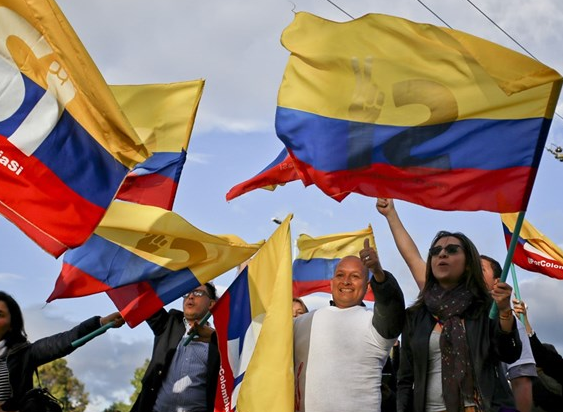(单词翻译:单击)
JUDY WOODRUFF: This coming Monday, in Cartagena, Colombia, a peace deal will be signed that aims to end more than 50 years of war. The accord also will mark the end of the insurgency by the revolutionary armed forces of Colombia, known as the FARC.
Hari Sreenivasan has more.
HARI SREENIVASAN: All this week, the guerrilla group has been meeting at a desolate location in Southern Colombia. Today, unanimously, the FARC voted to approve the deal and form a new political party.
After the signing this coming Monday, the accord must survive one more hurdle, a nationwide popular referendum next weekend.
Special correspondent Nadja Drost has been at this meeting all week, and joins me now.
Nadja, we usually don't talk about political conventions in other countries. And the images that I have seen from here have sound stages, fog machines. It seems almost like a musical festival. Give us a sense of what it was like there.
NADJA DROST: Well, to give you a sense of where we are, we are in the middle of the Colombian plains, essentially the middle of nowhere, and we're surrounded by miles and miles of shrubland.
It might strike one as a strange place to hold an enormous conference, but this is a FARC stronghold and it has significant historical meaning for the rebel group.
The conference that the FARC has been holding here this week is historic. It is their final conference as an armed group. Here, they have made the decision to terminate their armed existence and they have been plotting their strategy to transform to a political party.
As you mentioned, there are sound stages, concerts. There are also guerrilla camps. They're really going all out. It looks like the FARC are using this as an opportunity to introduce a new face to the Colombian and international public. With over 300 journalists here camped out in the middle of nowhere, it's a chance for the FARC to change the image of them as a narco-terrorist group to a group of rebels who very much want peace and want to transform themselves to become political actors.

HARI SREENIVASAN: All right, so what's the next step here? How do they move forward to disarm?
NADJA DROST: If the peace accords do receive approval from the Colombian public, then FARC troops, thousands of them, will start mobilizing themselves into large areas that are being called zones of concentration, where they will stay put for six months as they start a gradual process of disarmament.
But FARC leaders here this week said that they need assurance that an amnesty law will be passed before their troops can move anywhere. They are demanding that they have legal protections to ensure their troops are not going to get arrested as they move on that.
HARI SREENIVASAN: What are the indications in how that referendum vote will go?
NADJA DROST: It is leaning more towards the side of accepting the peace deal. However, there is a very strong campaign, being led mostly by former President Alvaro Uribe, in rejection of the peace deal.
However, both sides of the negotiation, both the FARC and the government, have made very clear that, if the no side wins, if the public rejects this peace deal, there is no way that they are going back to the negotiating table.
One of the FARC head negotiators, Carlos Antonio Lozada, told reporters that there is not even the remotest possibility. And on the government side, it's expected that in the case that this referendum fails the peace process, then we will likely not see another negotiation for at least 10 years.
So both the FARC and the government are sending a very strong message to the public that this is Colombia's best, if not possibly last chance for peace.
HARI SREENIVASAN: All right, Nadja, you have covered the FARC for a long time. How did we get to this point?
NADJA DROST: There have been many attempts in the past decades to end this conflict, both through negotiation or through military means.
Essentially, both sides have become very tired of war. Colombia has lived now in 52 years of war. The FARC has suffered year after year of military blows. Their ranks have been shrinking. And despite very strong military campaigns, the Colombian government has not defeated them entirely.
So, I think that it became clear to both sides that this war was going to be intractable unless a negotiation took place.
HARI SREENIVASAN: All right, special correspondent Nadja Drost joining us from Colombia tonight, thanks so much.
NADJA DROST: Thank you so much.


